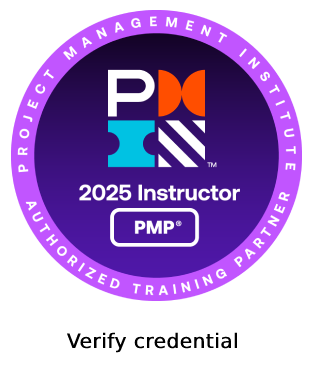Course Description
Course Overview: PMI-ACP® Certification Training
This course prepares you for the PMI-Agile Certified Practitioner (PMI-ACP)® exam and equips you with the skills to become an Agile Certified Practitioner. The PMI-ACP certification is one of the most sought-after credentials in Agile Project Management, validating your expertise in agile practices and frameworks such as Scrum, Kanban, Lean, extreme programming (XP), and test-driven development (TDD). It demonstrates your ability to manage projects in a fast-paced, complex environment with adaptability and collaboration.
Why PMI-ACP Certification Matters
In today’s dynamic work environment, the demand for agile project management professionals continues to grow. As organizations increasingly adopt agile methodologies to enhance productivity and deliver customer value, the PMI-ACP credential becomes essential to stand out. With a globally recognized certification, you will prove your proficiency in agile principles, enhance your versatility across different agile frameworks, and be better equipped to lead high-performing teams that deliver value efficiently.
The PMI-ACP certification covers a broad range of agile approaches, empowering project managers to adapt to the specific needs of each project. This course will enable you to embrace agile values, foster collaboration, and effectively manage project complexity.
Course Downloads

When I decided to join the course, I just wished to get PMP certificate but later I found that my focus then was moved to earning knowledge and idea actually applicable for real-life project management. This is more important and useful for me. On top of that, (…)
- Master Agile Principles and Mindset: Develop a deep understanding of agile principles, fostering continuous improvement, innovation, and team empowerment.
- Lead Agile Teams: Enhance your leadership and collaboration skills to form high-performing teams, promote transparency, and resolve conflicts.
- Manage Agile Products and Delivery: Learn to manage product backlogs, optimize value delivery, and use agile metrics to ensure project success.
- Apply Agile Techniques Across Frameworks: Gain practical knowledge of Scrum, Kanban, Lean, and other frameworks to deliver high-quality products that meet stakeholder expectations.
Select and Register for PMI-ACP Exam Prep

Key Features of PMI-ACP Exam Prep Training
The PMI-ACP Certification Advantage
Certifies your talent:
The PMI-ACP credential is proof that as a project manager you have the experience and skills to apply agile tools and techniques to make the project successfulImproves your earning prospects:
Professionals with PMI-ACP credential usually see better salary hikes than their non-certified counterpartsOpens doors
Widely applicable:
Since PMI-ACP certification is widely-recognized across the globe, its applicability is universal across industries, market segments and geographiesContinuous learning:
In order to maintain your PMI-ACP credential valid, you will have to keep yourself updated at regular intervals with best practices in the domain of agile project managementDid You Know?
- According to PMI’s “2015 Pulse of the Profession” report, it says that 75% enterprises that are highly agile are more responsive to the dynamics of the competitive market and complete their projects successfully than those with low agility at 56%.
- As per research conducted at the Massachusetts Institute of Technology, it says that agile enterprises grow revenue 37% faster and also generate 30% higher profits than non-agile enterprises.
Detailed Course Syllabus
- Project Victor’s Designed PMI-ACP Exam Course Material
- Project Victor Course completion certification
- 2.5 Days at a reputable hotel that includes 2 coffee breaks and International Buffet lunch
- PMI® Contact Hours: Each Contact Hour is 1 PDU (Total of 21 Contact Hours/PDUs for full course)
- Sample PMI-ACP Questions and Answers on each module.
- All the training and content required to pass the Project Management Professional (PMI-ACP®) exam
- Project Victor Project Management Training
- Pens, Pencils, Markers, Eraser
- President of PMI Thailand Chapter for 13 years (2011-2023);
- Currently Past President and Chapter Counselor.

- He is a Certified Program Management Professional (PgMP®) (Project Management Institute – www.pmi.org); Certificate # 2079271.
- He is a Certified Project Management Professional (PMP/CAPM®) (Project Management Institute – www.pmi.org); Certificate #1258917
- He is an Agile Certified Practitioner (PMI-ACP®) (Project Management Institute – www.pmi.org); Certificate #2600926
- He is a Certified Scrum Master (CSM®) (Scrum Alliance – www.scrumalliance.org); Certificant ID: 001062861
- He is a SAFe Program Consultant (SPC)® 6.0; Certificate ID: 50804412-3031
- He is a SAFe Agilist® 6.0 (www.scaledagile.com); Certificate ID: 23353981-8934
- He is Certified Risk Management Professional (RMP®) (Project Management Institute – www.pmi.org); Certificate #2033120
- He was Vice President at one of the largest Thai Systems Integrator public company for more than 10 years.
- He has experience managing and leading mega-projects (Information Technology, Airport-related, CCTV-related, Transport-related, and Power Infrastructure) in various industries.
- He is a commercial contract manager, reviewer, and advisor.
- He teaches part-time at King Mongkut University of Technology (Thonburi) – Graduate School of Management and Innovation (Master Degree in Project Management). He is an invited lecturer to Chulalongkorn University.
- He holds a Doctorate degree obtained from Assumption University of Thailand with an international record of publications in refereed journals with a special concentration on business management.
- He has trained more than 5000 program/project managers, project engineers, project coordinators, and project team members since 2010.
- He has helped certify more than 800 Project Management Professionals (PMP/CAPM) in Thailand.
- He is also a highly experienced speaker and trainer who is also passionate about Project Management.
Delivery Method
- Instructor led, group-paced, classroom-delivery learning model with structured hands-on activities.
Course Duration
- 3 Days (equivalent to 28 Contact Hours or Professional Development Units – PDUs)
Course Objectives
This course focuses on PMI-ACP® training and prepares participants for the PMI-ACP® exam, helping them become Agile Certified Practitioners, a globally recognized certification from the Project Management Institute (PMI)®. The course covers key concepts in Agile Project Management and emphasizes the application of agile practices across multiple frameworks, enhancing your ability to lead agile teams and implement agile methodologies in your organization.
By the end of this course, participants will be able to:
Understand and Apply the Agile Mindset
- Embrace the core values and principles of Agile and foster an environment conducive to experimentation, learning, and innovation.
- Build a collaborative, high-performing team by encouraging shared vision and psychological safety.
- Utilize retrospective findings and feedback loops to continuously improve team performance.
Lead and Empower Agile Teams
- Establish an environment of trust, transparency, and motivation to drive high team performance.
- Facilitate problem resolution and conflict management within Agile teams.
- Promote knowledge sharing, collective ownership of goals, and continuous improvement.
Develop and Deliver Value through Agile Product Management
- Prioritize and manage product backlogs, ensuring alignment with business needs and stakeholder feedback.
- Visualize work, manage value delivery, and optimize the flow of product increments to deliver value in small, measurable iterations.
- Define and manage increments, ensuring alignment with organizational objectives and stakeholder requirements.
Optimize Agile Project Delivery
- Utilize Agile metrics to monitor progress, measure value, and drive decision-making.
- Proactively identify, manage, and mitigate risks and impediments to maintain project flow.
- Continuously engage customers, incorporating their feedback to ensure that deliverables meet acceptance criteria.
Map Agile Approaches to PMI’s Domains and Frameworks
- Align Agile practices with PMI’s four core domains: Mindset, Leadership, Product, and Delivery.
- Integrate Agile methodologies with the Project Management Body of Knowledge (PMBOK®) and other relevant PMI standards.
Target Audience
- Project Managers
- Project Leaders
- Project Team Members
- Managers (Directors, General Managers)
- Professionals interested in applying for the PMI-ACP Exam
Eligibility
According to the PMI®, the main pre-requisites for taking the PMI-ACP® exam are:
- Secondary diploma (high school diploma, GED, associate’s degree or global equivalent)
- Agile Project Experience: 2 years of agile experience in past 5 years OR 1 year agile experience and degree from Global Accreditation Center (GAC program) OR 1 year agile experience and active 3rd party agile certification (current and earned more than 1 year ago) OR Active PMP Certification.
- Training in Agile Practices: 28 contact hours of formal training in agile practices, frameworks, methodologies.
Course Content
This course focuses on PMI-ACP training – and will prepare you to take the PMI-ACP® exam and become an Agile Certified Practitioner, a certification from the Project Management Institute (PMI)®. The PMI-ACP exam measures professionalism in Agile Project Management, increases versatility in PM methods, validates ability to lead Agile teams and finally provides a framework for Agile training.
- Topic 1: Agile Principles and Mindset (Domain 1: Mindset)
Why Use Agile?
Knowledge Work Projects Are Different
Defined versus Empirical Processes
The Agile Mindset
Personal, Team, and Organizational Agility
The Agile Triangle
The Agile Manifesto
The Four Values
The Twelve Principles
Agile Methodologies
Scrum
Extreme Programming (XP)
Lean Product Development
Kanban
Feature-Driven Development (FDD)
Dynamic Systems Development Method (DSDM)
Crystal
Agile Process Overview
Agile Leadership
Management versus Leadership
Servant Leadership
Twelve Principles for Leading Agile Projects
Agile Leadership Practices
Leadership Tasks
Module Review - Topic 2: Value-Driven Delivery (Domain 4: Delivery)
What is Value-Driven Delivery?
Deliver Value Early (Eat Your Dessert First!)
Minimize Waste
Assessing Value
Financial Assessment Metrics
Earned Value Management
Agile Project Accounting
Key Performance Indicators (KPIs)
Managing Risk
Regulatory Compliance
Prioritizing Value
Customer Valued Prioritization
Prioritization Schemes
Relative Prioritization/Ranking
- Topic 2: Value-Driven Delivery (Continued)
Delivering Incrementally
Minimal Viable Product (MVP)
Agile Tooling
Low-Tech, High-Touch Tools
Task/Kanban Boards
Work in Progress (WIP)
WIP Limits
Cumulative Flow Diagrams (CFDs)
Bottlenecks and the Theory of Constraints
Agile Contracting
Agile Constraints and Contracts
DSDM Contract
Money for Nothing and Change for Free
Graduated Fixed-Price Contract
Fixed-Price Work Packages
Customized Contracts
Verifying and Validating Value
Frequent Verification and Validation
Testing and Verification in Software Development
Module Review
PMI-ACP Practice Exam Questions - Topic 3: Stakeholder Engagement (Domain 2: Leadership)
Taking Care of Stakeholders
Stakeholder Stewardship versus Stakeholder Management
Educating Stakeholders about Agile
Keeping Stakeholders Engaged
Why the Big Focus on Stakeholders?
Principles of Stakeholder Engagement
Establishing a Shared Vision
Agile Chartering
Definition of “Done”
Agile Modeling
Wireframes
Personas
Communicating with Stakeholders
Face-to-Face Communication
Two-Way Communication
Knowledge Sharing
Information Radiators
Social Media
Working Collaboratively
Workshops
Brainstorming
Collaboration Games
Using Critical Interpersonal Skills
Emotional Intelligence
Active Listening
Facilitation
Negotiation
Conflict Resolution
Participatory Decision Making
Module Review - Topic 4: Team Performance (Domain 2: Leadership)
Why People Over Processes?
Agile Team Roles
Building Agile Teams
Benefits of Generalizing Specialists
Characteristics of High-Performing Teams
Models of Team Development
Adaptive Leadership
Team Motivation
Training, Coaching, and Mentoring
Creating Collaborative Team Spaces
Co-Located Teams
Osmotic Communication
Global, Cultural, and Team Diversity - Distributed Teams
Tracking Team Performance
Burn Charts
Velocity
Module Review - Topic 5: Adaptive Planning (Domain 3: Product)
Agile Planning Concepts
Adaptive Planning
Agile versus Non-Agile Planning
Principles of Agile Planning
Agile Discovery
Progressive Elaboration
Value-Based Analysis
Value-Based Decomposition
Timeboxing
Estimate Ranges
Ideal Time
- Topic 5 Adaptive Planning (Continued) (Domain 3: Product)
Sizing, Estimating, and Planning
Decomposing Requirements
User Stories
User Story Backlog (Product Backlog)
Refining (Grooming) the Backlog
Relative Sizing and Story Points
Affinity Estimating
T-Shirt Sizing
Story Maps
Product Roadmap
Wideband Delphi
Planning Poker
Release and Iteration Planning
Types of Iterations
Spikes
High-Level Planning (Visioning)
Release Planning
Iteration Planning
Daily Stand-Ups
Module Review - Topic 6: Problem Detection and Resolution (Domain 4: Delivery)
Understanding Problems
How Problems Impact a Project
The Cost of Change
Technical Debt
Create a Safe and Open Environment
Failure Modes
Success Modes
Success Strategies
Detecting Problems
Lead Time and Cycle Time
Defects
Variance Analysis
Trend Analysis
Control Limits
Managing Threats and Issues
Risk-Adjusted Backlog
Risk Severity
Risk Burndown Graphs
Solving Problems
Engage the Team
Some Problems Can’t Be Solved
Module Review - Topic 7: Continuous Improvement (Domain 4: Delivery)
Kaizen
Multiple Levels of Improvement
Continuous Improvement-Process
Process Tailoring
Systems Thinking
Process Analysis
Value Stream Mapping
Project Pre-Mortems
Continuous Improvement- Product
Reviews
Product Feedback Loops and Learning Cycles
Feedback Methods
Approved Iterations
Continuous Improvement-People
Retrospectives
Team Self-Assessments
PMI’s Code of Ethics and Professional Conduct
Module Review
PMI ACP Mock Exam Questions
Wrap-up and Adjourn
We’ve Trained Professionals
across Global Companies













































Need more information on Trainings?
We’re a click away
Free Shipping
Free Shipping for orders over £130
Money Guarantee
Within 40 days for an exchange.
Flexible Payment
Pay with Multiple Credit Cards
Online Support
24 hours a day, 7 days a week
Don't compromise on quality!
Subscribe to the newsletter
- TEL : 0980 444 45 456
- MAIL : hello@demo.com
Don't compromise on quality!
- TEL : 0980 444 45 456
- MAIL : hello@demo.com
About Wooma
Help
Categories
Campaigns
Company
Resources
Contact Details
-
200/05, Narathiwat Ratchanakarin Road,
Chongnonsi Yannawa, Bangkok 10120 - info@projectvictor.com
- (66) 92 348 4772
- (66) 02 294 2492
Copyright © 2025. Project Victor Co., Ltd. All Rights Reserved.
- Call us on (66) 92 348 4772
“PMI,” “PMP,” “CAPM,” “PMI-ACP,” “PMBOK,” and the PMI Authorized Training Partner logo are registered marks of the Project Management Institute, Inc.
“ITIL®,” “PRINCE2®,” “MSP®,” and “P3O®” are registered trademarks of AXELOS Limited, used under permission of AXELOS Limited. View Disclaimer




